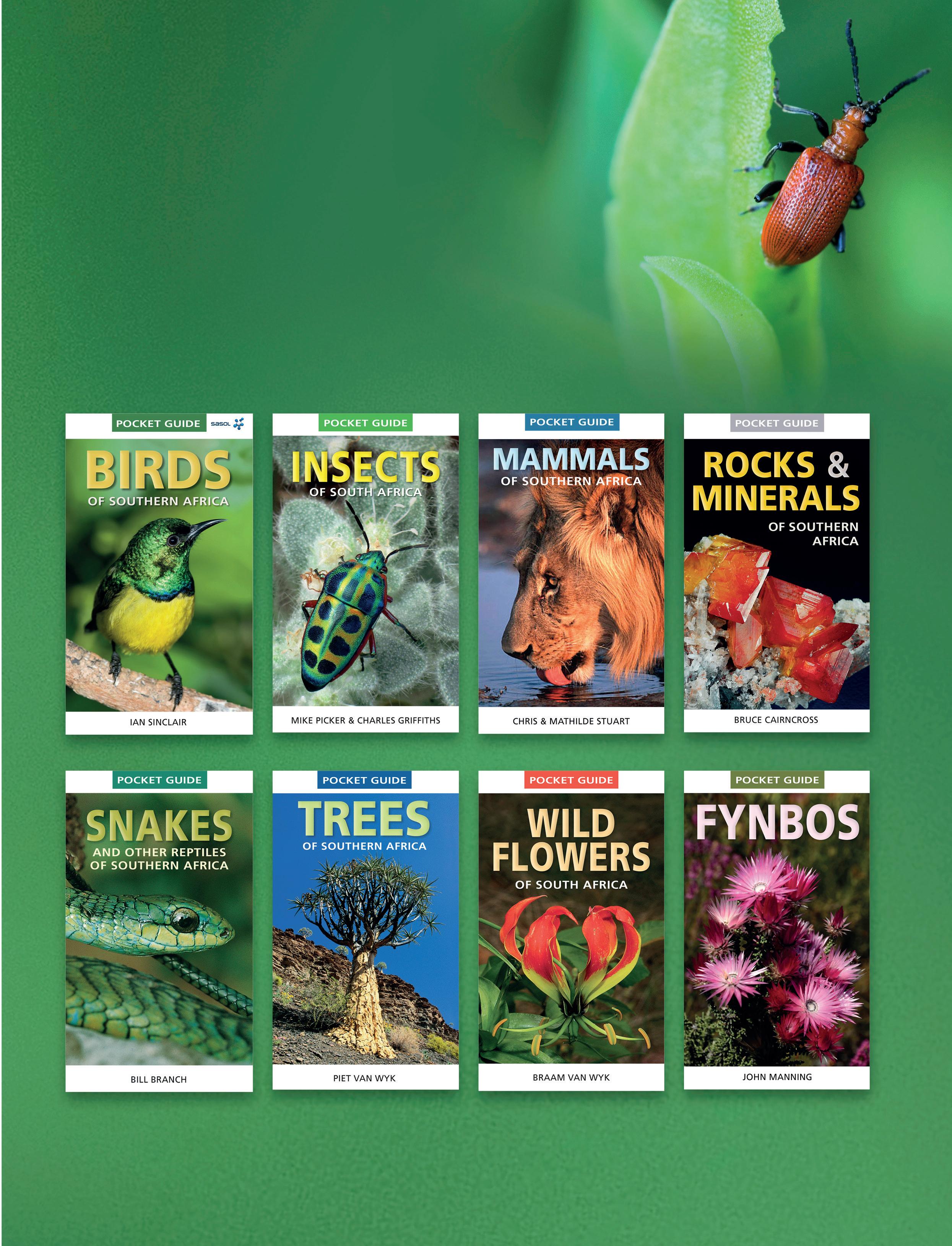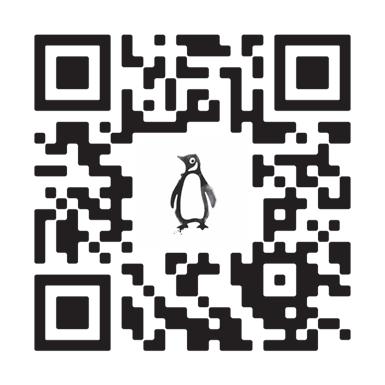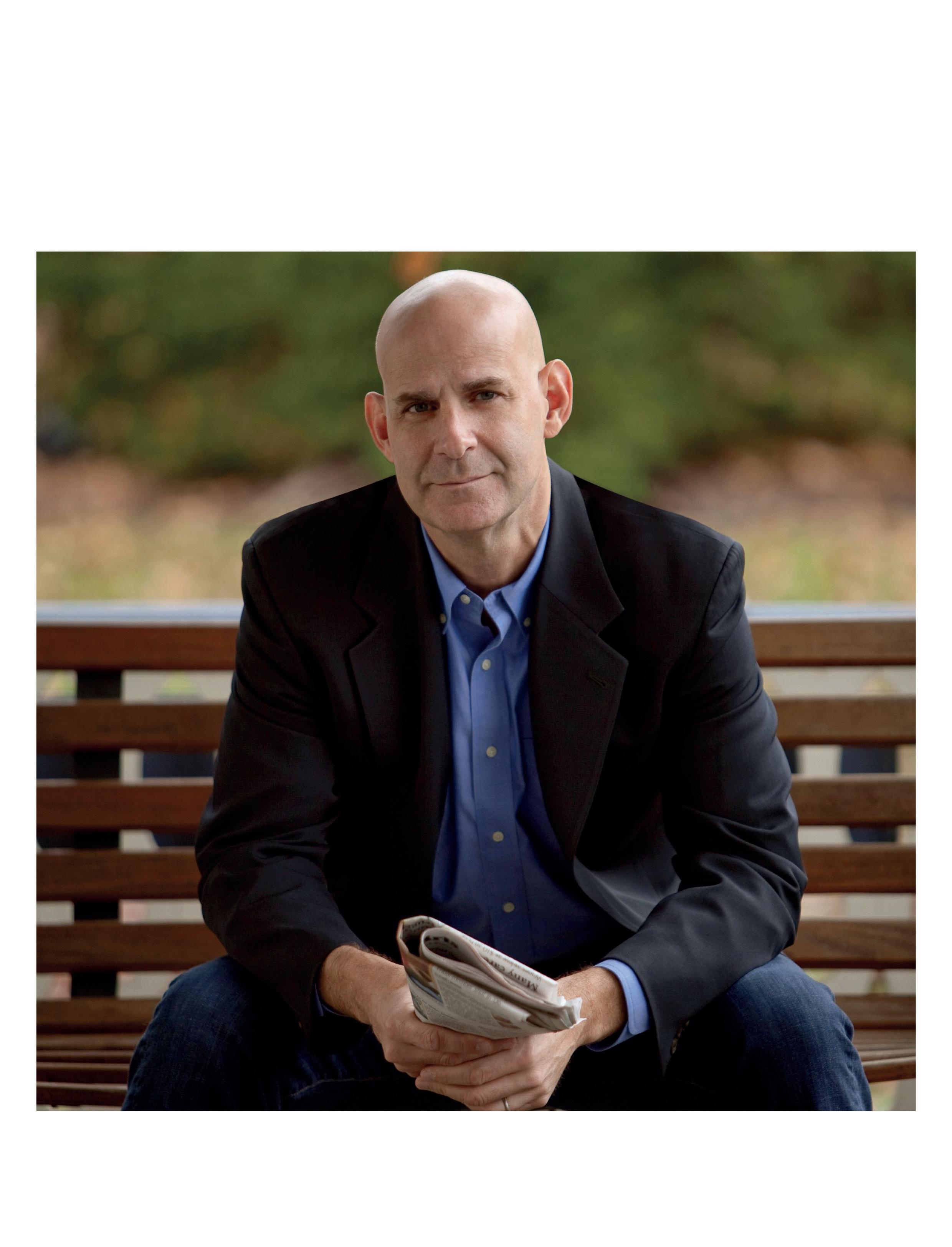






“WIN IS MY DARKEST HERO. THE ANTI-HERO.”








“WIN IS MY DARKEST HERO. THE ANTI-HERO.”

Fanatics members earn up to 5% back in rewards on all purchases in Exclusive Books stores and online. Members can also look forward to double points or bonus points on promotions, members-only special offers and competitions, invites to book launches, events and more! Sign up at Exclusive Books stores nationwide or online.
02 BOOKSCAPE
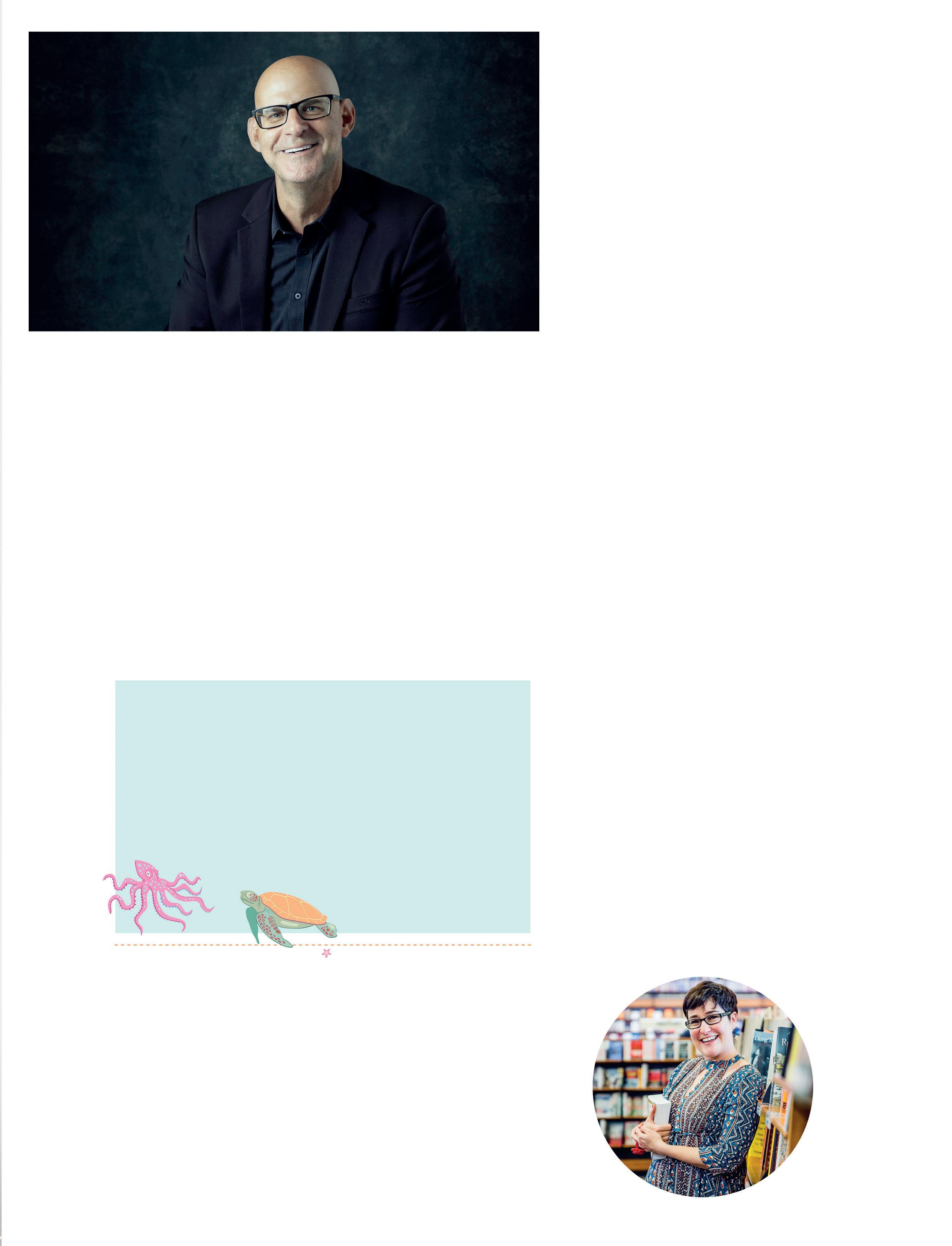
07
08
10 AT MY DESK
To the first issue of Exclusive Reads, a collaboration between Exclusive Books and Penguin Random House South Africa. It’s our way of keeping you up to date with the newest and bestselling books in our stores and online – and giving you a little extra reading to dive into before you get your book in hand.
We break out this issue with cover author Harlan Coben. We were lucky recently to have an hour with Coben for an exclusive online event, and the highlights from that, including his take on the hero in his newest thriller, Win, are on page four. Coben is the number one New York Times author of thirty-two novels, and the creative and executive producer of several successful Netflix series based on his books.
There’s also an extract from The Profiler Diaries by Gérard Labuschagne on the senseless murder of Thembinkosi Cebekhulu. The book is a fascinating – and often terrifying – glimpse into what it was like to be a profiler in the world’s busiest profiling unit from the former South African Police Service head profiler.
Yotam Ottolenghi’s cookbooks are consistent bestsellers at EB, so it was only natural that our cookery pages feature his mouth-watering recipes. Indulge with his Spicy Mushroom Lasagne or Slow-Cooked Chicken Bake – simply divine, and the ultimate in comfort food.
Then in kids, we have an interview with Diary of a Wimpy Kid bestseller, Jeff Kinney, an extract from the new Holly Bourne, The Yearbook, and a topsy-turvy trick from Roald Dahl’s The Twits.
So grab a cuppa, settle in, and enjoy! Yours in reading,
news | snippets | events | what’s new
In The President’s Daughter, every detail is accurate, and the drama and action never stops. That’s because it’s co-written by former US president Bill Clinton and bestselling author James Patterson, the second novel from the duo.
“I never imagined I’d be writing a book with a master storyteller like Jim, much less two,” said Clinton.
“I was grateful for the success of the first book, and I believe readers will enjoy reading The President’s Daughter as much as I enjoyed working on it.”
The political thriller is a standalone, with a new, original cast of characters. But, like their 2018 blockbuster, The President is Missing, the story is told with Patterson’s signature suspense and informed by details that only a president can know.
“Working with President Clinton has been a highlight of my career, and I’m thrilled to have had the chance to write with him again,” said Patterson. “It was gratifying to see the enthusiastic response to our first book, and I’m eager to get The President’s Daughter into the hands of readers – they won’t be disappointed.”
The President’s Daughter is about Matthew Keating, a onetime Navy SEAL – and a past president – who has always defended his family as staunchly as he has his country. But when a madman abducts his teenage daughter, Melanie, Keating’s deepest fear turns into a matter of national security. As the world watches in real time, he embarks on a one-man special-ops mission that tests his strengths: as a leader, a warrior, and a father.
The President’s Daughter is out now.

Relive the sensuality, the romance and the drama of Fifty Shades Freed through the thoughts, reflections, and dreams of Christian Grey.
It's the wedding of the decade. Christian Grey will make Anastasia Steele his wife. But is he really husband material? And marriage brings its own challenges. Ana's defiant spirit continues to stir Christian's darkest fears and tests his need for control. As old rivalries and resentments endanger them both, one misjudgement threatens to tear them apart.
Can Christian overcome the nightmares of his childhood and the torments of his youth, and save himself?
Can Christian finally be freed?
Read an extract at www.eljamesauthor.com/blog
“So while once we asked, How could we possibly prevail over catastrophe?, now we assert, How could catastrophe possibly prevail over us? We will not march back to what was, but move to what shall be. A country that is bruised but whole, benevolent but bold, fierce and free.”
– Amanda Gorman, The Hill We Climb
Don’t miss out this month...
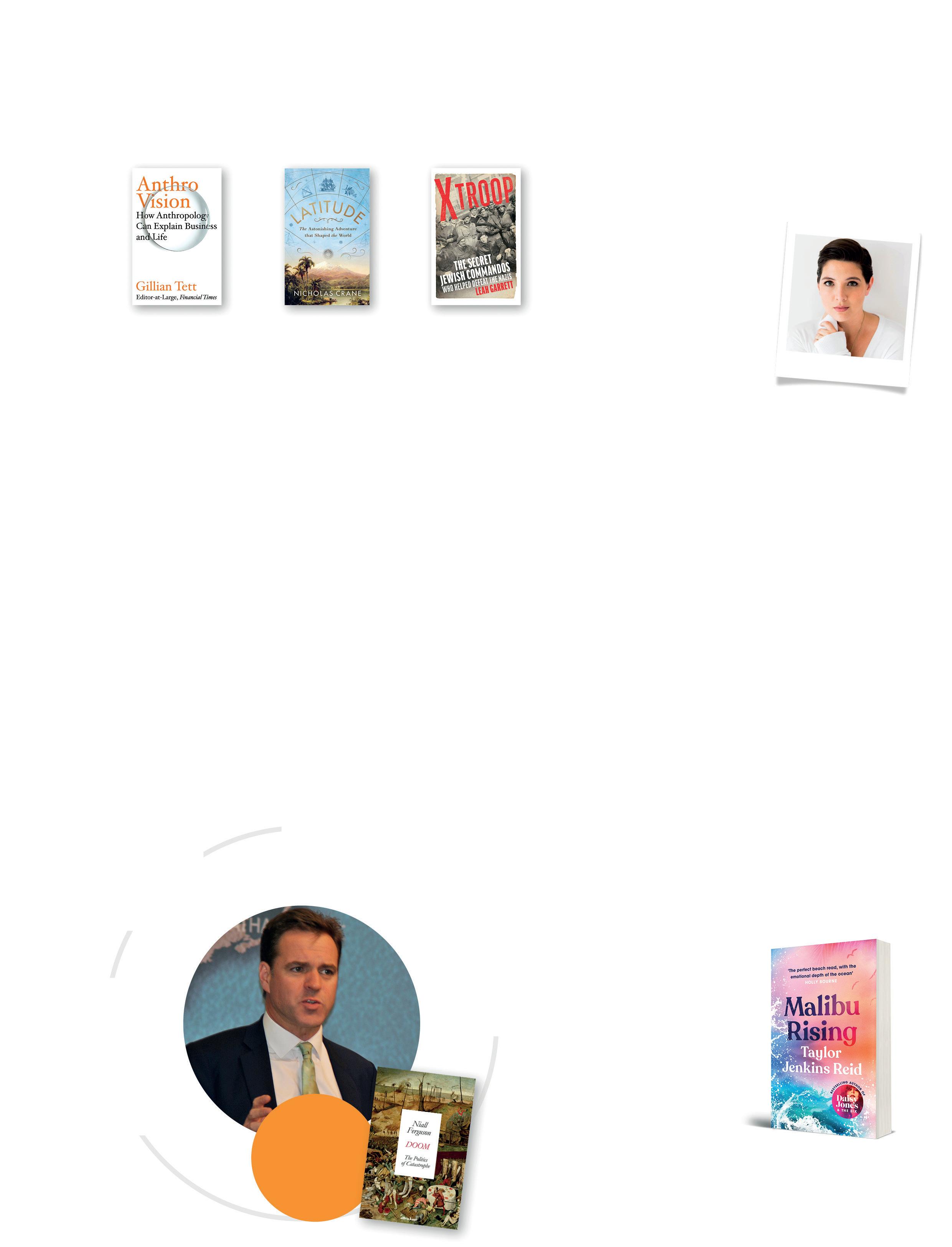
Anthro-Vision
by Gillian TettA new generation of anthropologists is using cultural immersion, revealing the rituals that govern how people act, to illuminate the behaviour of businesses and consumers.
Latitude
by Nick CraneThis story of the first major expedition to discover the shape and magnitude of the earth weaves scientific rigour, egos, funding crises and betrayal with sea voyages, jungles and volcanoes.
X Troop
by Leah GarrettThis WWII book tells the story of the X Troop men who helped defeat the Nazis and liberate the concentration camps where their families had either been killed or imprisoned.
Sign up to our sister magazine, The Penguin Post, and stand a chance to win a book hamper valued at R2 000! To enter, visit www.penguinrandomhouse.co.za/penguin-post and click to sign up. Ts & Cs apply; entries close 30 June 2021.
Named among the 100 most influential people by Time magazine

One
The Daisy Jones and The Six author talks famous siblings, eighties music and the inspiration for her new book, Malibu Rising
How did the characters in the Riva family come to life on the page? The Rivas came to life as I began to understand their parents, June and Mick. And then it became about how each of the siblings was shaped by the others. Nina is the first-born dutiful daughter, Jay thinks he’s the man of the house, Hud is always trying to smooth things over for Jay, and Kit has this chip on her shoulder, the one always left out. All of that is based on what they’ve learned from one another.
Why did you decide to set the main action of the story over the course of just twenty-four hours? The idea of a party that grows wildly out of control had been in the back of my mind for a few years. And just like some of my other novels, which have taken me a while of thinking about before they could come to fruition, this one sort of sat there waiting for me to figure out how to tell it. Once I hit on the idea that we are seeing a family over the twenty-four hours leading into a party and then the party itself, the structure for the novel became clear to me.
Ever wondered what’s behind this prolific historian? We break it down. Graduates with a first-class honours degree in History
17 books published, including his 2003 bestseller
Empire: How Britain Made the Modern World
Doom: The Politics of Catastrophe is out now.
Wins an International Emmy for his documentary series, The Ascent of Money
What are other books or writers that influenced you when writing Malibu Rising? It feels obvious now but during the writing of the novel, I forgot just how much I was inspired by The Great Gatsby. It’s the party, obviously. The namedropping, and the excess. But I also think there’s the element of carelessness that first came in full focus for me in Gatsby and runs throughout the novel for some characters.
Malibu Rising is out now.
Bestselling author Harlan Coben chats with Ben Williams about writer’s empathy, veering off course and the dark –probably sociopathic – hero in his newest thriller, Win.
“I’m known as the plot guy, ready with all the thrilling twists and turns –and really, it can make me quite rude company when I drift off with an idea – but those don’t work if you don’t care about the characters. It’s like having the most expensive car in the world but no gas. In many ways, the character is more work than the plot, but they both inform one another. You can’t have characters doing what would work for the sake of the plot and vice versa, so the marriage of the two is a constant battle.
When I start a new book, I come up with the story and then find the character who’s going to tell it. For my latest novel, it was Windsor Horne Lockwood III – or Win, as his friends call him. Win is the billionaire friend of Myron Bolitar, the lead I wrote into his own series of books. Win had never been
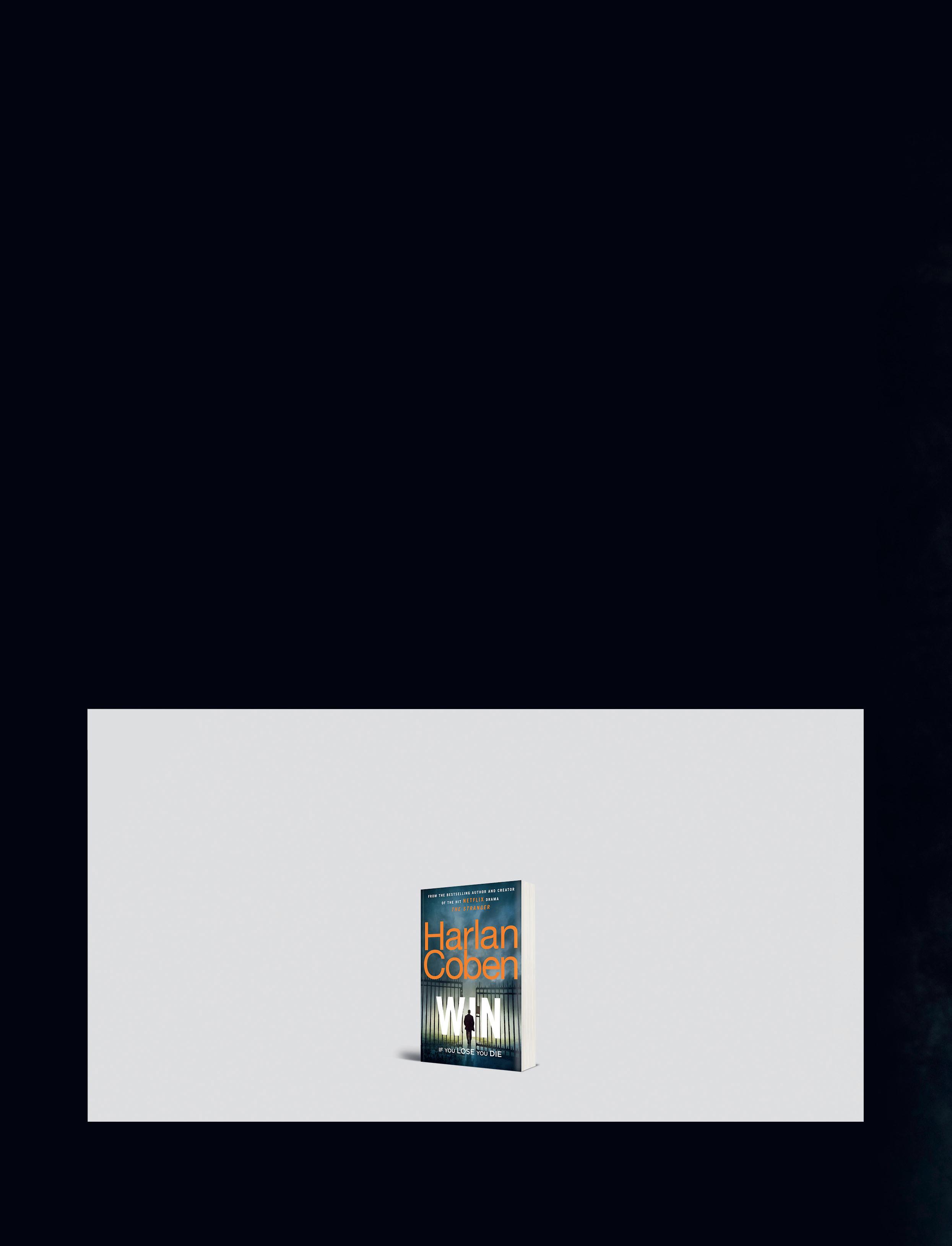
the main character, but I’d always wanted to bring him back in some way, and when the plot came together for a mystery involving an art heist, heiress kidnap, sixties radicals and a murder in an Upper West Side apartment, I knew Win was my guy. Because he’s from that world. He would have an heiress relative, he would own a Vermeer painting, he would live on the Upper West Side and be familiar with its lush penthouse apartments. He has advantages associated with that world – a private plane, a helicopter, and all sorts of other toys – which gives him the freedom to do pretty much anything he wants.
But he’s a flawed man, and he recognises that about himself. He has a vigilante streak in him and admits that he likes violence more than he should. He does things some of the time that you might not necessarily agree
The good guy doesn’t always do the good thing. It’s never that straightforward.
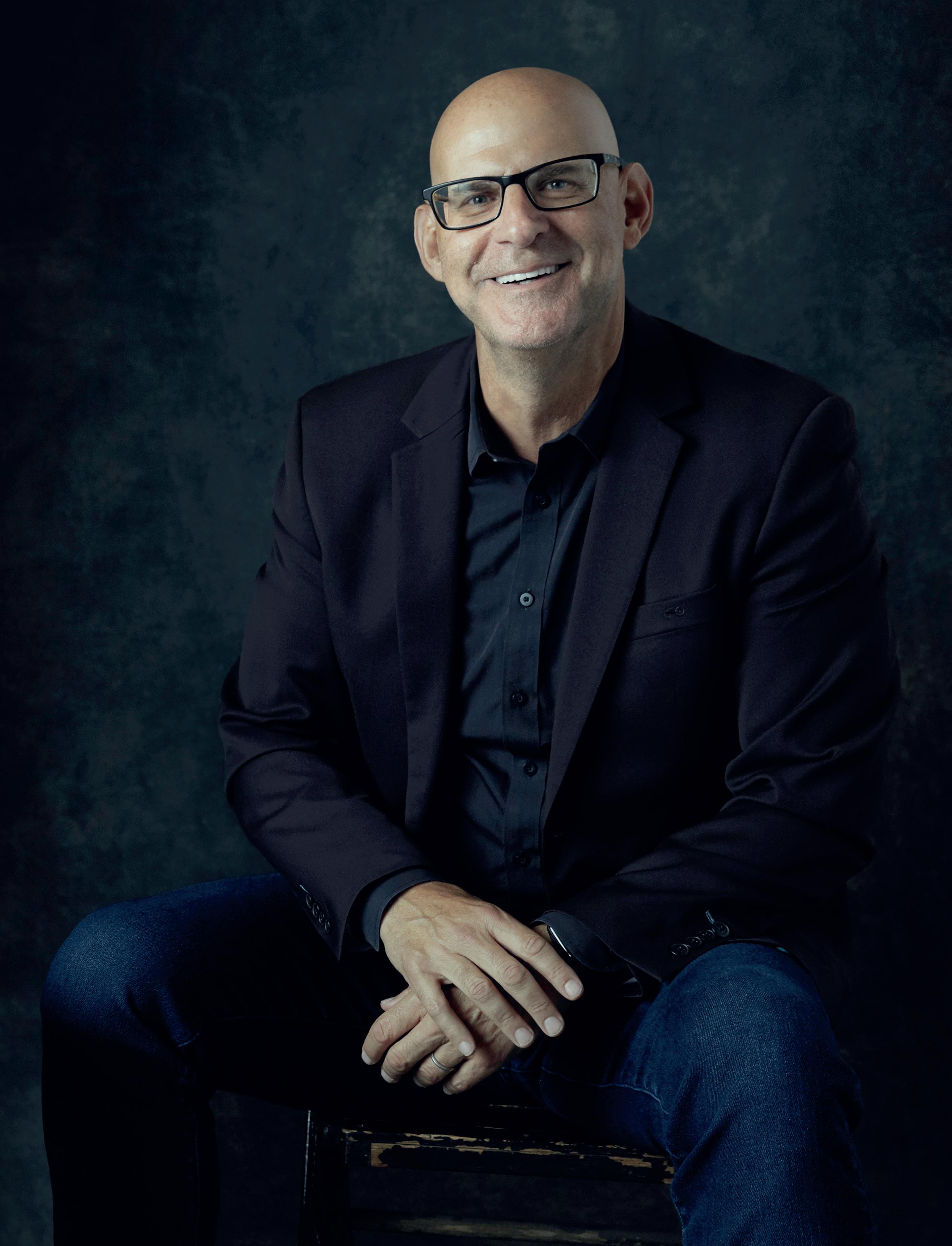
with, but you can also understand where he’s coming from. He is by far my darkest –probably sociopathic – hero. The anti-hero. But he’s intriguing and interesting enough that you want to spend time with him.
To be a writer takes empathy. Stepping out of my shoes and into my character's. Figuring out what makes them tick and what kind of baggage they’re carrying, and how these might come together in their actions. It needs to be real, and in reality, there is friction and people are full of contradictions. The good guy doesn’t always do the good thing. It’s never that straightforward. I like to play on the edge of foul and fair, where the lines are blurred, because that’s where it gets interesting. I want you to ask yourself at the end, Are the villains really that bad?
When I start a new book, it helps me to know the ending. I compare it to driving from my home in New Jersey all the way across the country to Los Angeles. I can take the direct route, but chances are I'll go via the Suez Canal or Tokyo, or have hot dogs in Florida. But as long as I know I'm going to end up in LA, I can more easily veer off and have fun with confidence.
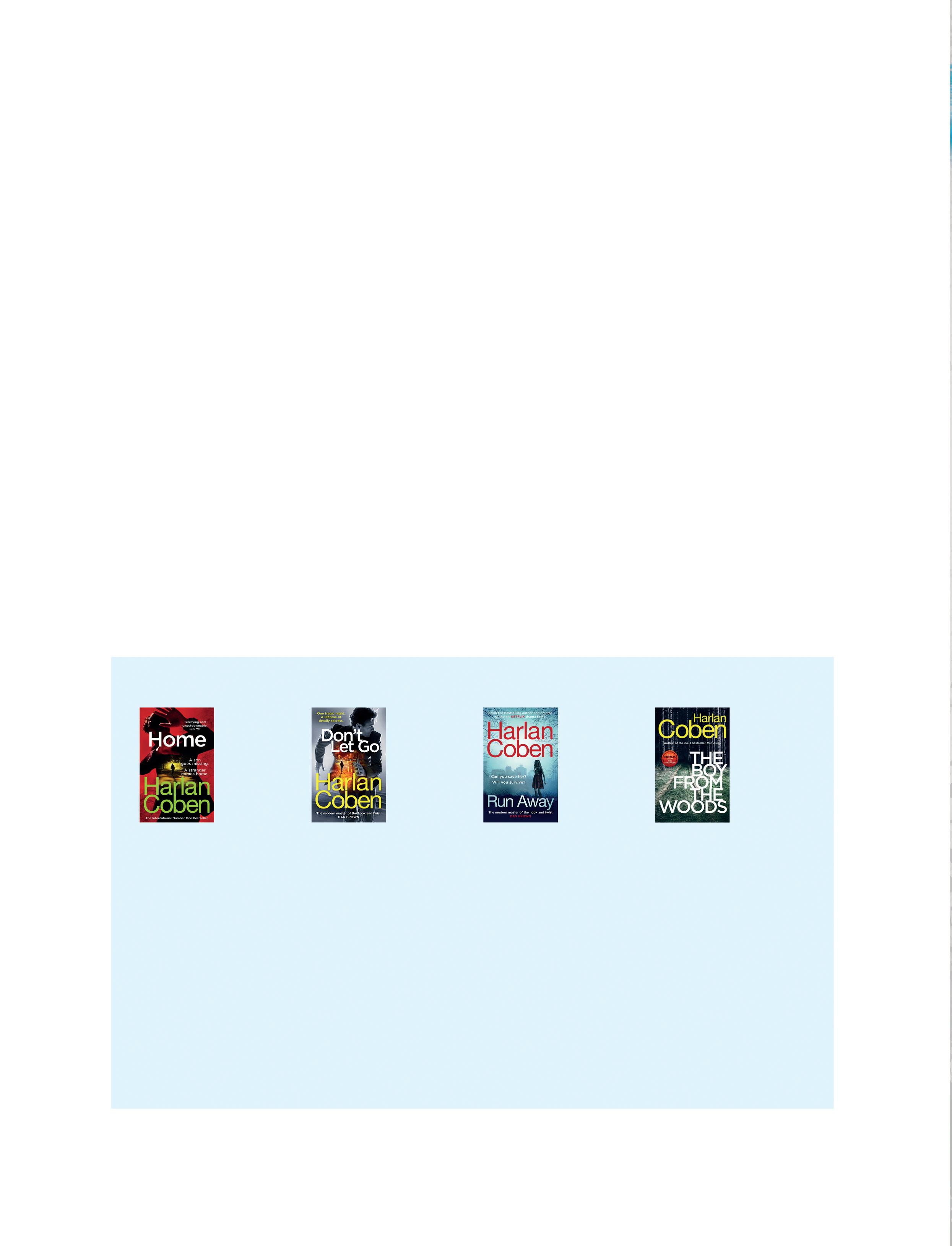
View the entire interview on our Facebook page at www.facebook.com/ ExclusiveBooks/ videos/ 389421328714854
ALSO BY HARLAN COBENFor ten long years two boys have been missing. Now you think you’ve seen one of them. He’s a young man. And he’s in trouble. Do you approach him? Ask him to come home with you? And how can you be sure it’s really him? You thought your search for the truth was over. It’s only just begun.
When a teenage boy and girl were found dead, most people concluded it was a tragic suicide pact. The dead boy’s brother, Nap Dumas, did not. Now, Nap is a cop. One who has never made peace with his past. And when the past comes back to haunt him, Nap discovers secrets can kill...
My writing process is very simple. Does it help me write? Good. Doesn’t help me write? Bad. I’m not a guy who does word counts, like some other authors might do, setting themselves a daily target. I'll find a spot to work from and, if the writing flows, stick with it. Kind of like an athlete who wears the same lucky socks.
The second half of Win was written at home because of Covid, but having quite a busy household, that’s not usually the case. I've written everywhere, from airports to train stations. While I was working on The Stranger, I spent three weeks Ubering everywhere because I figured out I could write quite well in the back seat!
I do think I'll write another Win novel, but I just don't know. I never plan further than the book I'm writing now. I'm like a boxer in that sense. I'm fighting it, I have nothing left at the end of it, it's the fifteenth round, I've gone the distance, the bell rings and I can't even lift my arms. So do I think I'll write another Win book? Yeah! Do I think I'll write him with Myron? Yeah, maybe. Do I think I'll write it from Myron's viewpoint or Win's viewpoint? I just don't know yet."
Your daughter is missing. You’ll risk anything to find her. And then you see her, frightened and clearly in trouble. You approach her, beg her to come home. She runs. You follow her into a dark, world where no-one is safe and murder is commonplace. Now it’s your life on the line...
Thirty years ago, Wilde was found living a feral existence in the woods, with no memory of how he got there. Now a former soldier and security expert, he’s asked to help find a missing child. It’s a race to save the girl’s life – and expose the town’s dark secrets.
Over dinner, Joanne Fedler told her husband she’ll never write a book again. He wasn’t convinced.
“That’s it, I’m done,’ I declared over dinner. ‘I’m never writing another book again.’
‘Spoken like a true addict,’ my husband Zed said, ‘I can quit anytime… sure.’
‘Honey, you’re an author down to your marrow,’ my friend Ruth said. ‘You’re exhausted. You’ve just given birth to your thirteenth book. You know you can’t think about another baby straight after labour.’
‘That was my last,’ I declared.
‘Till the next one,’ Zed snickered.
‘If you ever hear me talking about writing another book again, you have my permission to inflict a horrible punishment on me.’
‘Like force you to watch a rugby match?’ Zed asked.
‘That’d do it,’ I shuddered.
‘You’re the scorpion in that story,’ Ruth continued. ‘Writing is in your nature.’
‘Nature, shmature,’ I retorted.
It was time to take myself in hand, do a cost-benefit analysis, ask practical questions like, ‘is it worth it?’ Thirteen books in and I was still relying on Zed to financially support me and it was hard to resist the conclusion that if one’s labour is not yielding the sort of fruit you can eat, perhaps it should be called a ‘hobby.’ Could a ‘calling’ reasonably expect one to marry a breadwinner or wallow in penury for its sake?
I devised a ritual to mark this break-up. Days later, I made my way to a cliff overlooking the ocean with my writing totem – a handcarved walking stick with a female figure holding a book. I’d bought it twenty-three years back, on holiday in the Transkei, when
Days later, I made my way to a cliff overlooking the ocean with my writing totem – a hand-carved walking stick with a female figure holding a book.
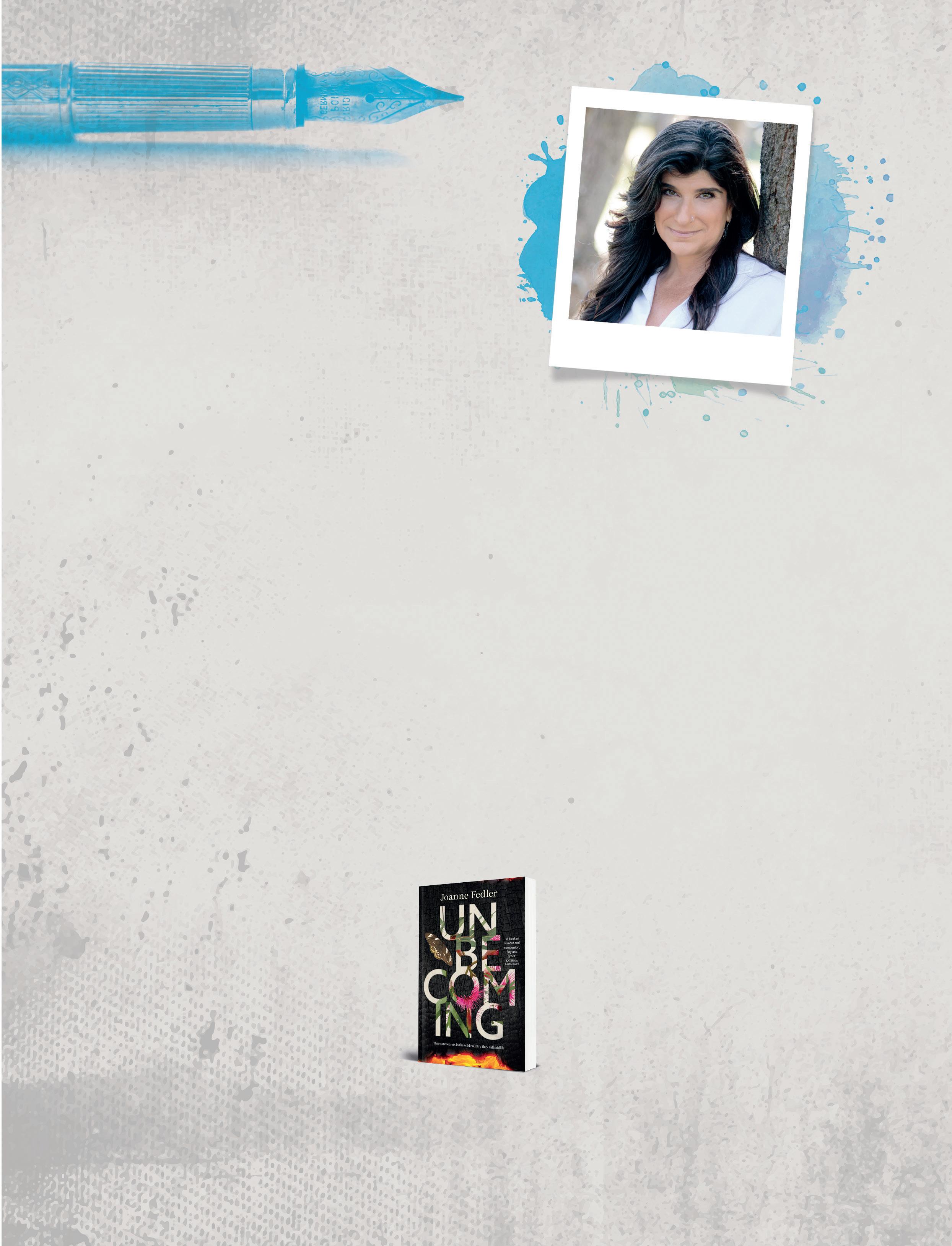
Unbecoming is out now.
being an author was an outrageous out-ofreach dream.
‘Goodbye, Woman-of-the-Book,’ I sobbed and I cast it into the churning waves.
For a few weeks I gardened, tidied and did a massive clean-out.
I revelled in my freedom from stories. I stopped fixating on word arrangements to build tension, paint story arcs and deepen characters. I fretted about mulch instead.
Then one morning at a café, I overheard a woman tell her friend that her current husband had forced her to agree not to have any contact with her first husband with whom she has a child. ‘I’m so angry about it now, I could burn the house down,’ she said. I took out my phone and wrote this down.
Down at the beach, a woman sat under a large brown hat, her limbs entwined, like strands of DNA. ‘I love the long-legged look of her,’ appeared in my head like sky-writing.
While reading Elie Weisel’s book, Night, I fixated on an anecdote about Madame Schachter, a woman who kept screaming she could see terrible fires while in the cattle cart on the way to the concentration camp. The men beat her into semi-unconsciousness, thinking she was mad. I could not stop thinking about her. In my diary I wrote, ‘She must have been psychic, deeply intuitive. What was her backstory? Were there Jewish witches beside her?’ Something was sizzling and popping in my brain.
‘What are you doing?’ Zed asked.
‘Nothing, just… jotting down some thoughts.’
Zed paused. ‘Rugby League or Rugby Union? You choose.’
In this gripping account, the former South African Police Service head profiler recalls one of some 110 murders and countless other bizarre crimes he analysed during his fourteen-and-a-half year career.
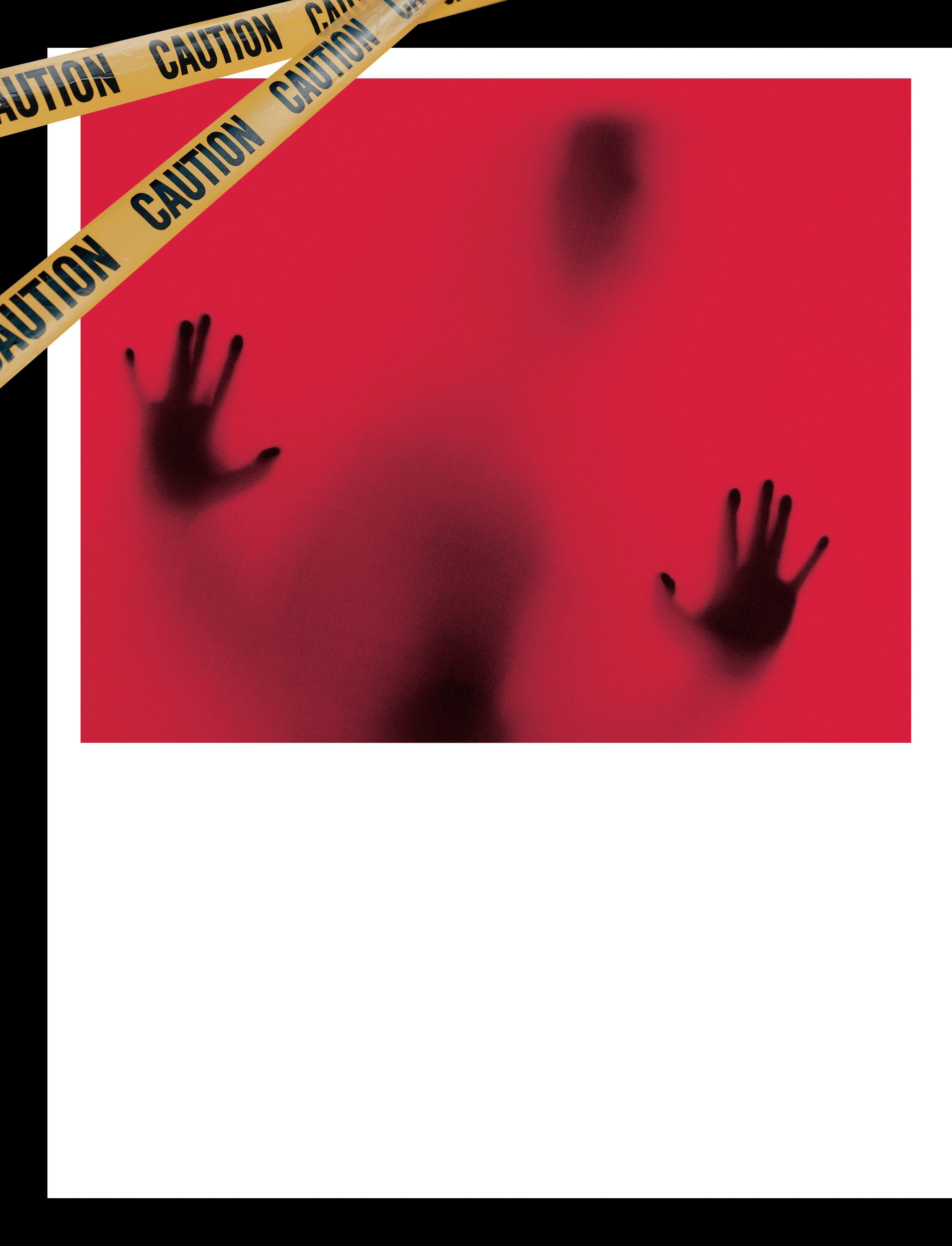
An expert on serial murder and rape cases, here, Labuschagne walks the reader through the senseless murder of Thembinkosi Cebekhulu by an assailant who turned out to be former Blue Bulls player Phindile Joseph Ntshongwana. Ntshongwana was found guilty in 2014 of kidnap, rape and killing four people with an axe.
“On 20 March 2011, Thembinkosi Cebekhulu was in Empangeni for his brother’s funeral when he received a phone call from his employer, asking him to come in and work the next day, which was a public holiday. He agreed, and on that same afternoon he started his journey back to Durban, where he lived with
his girlfriend, Mabel Dlamini. He called Mabel at about 21h15, telling her that he was at the garage in Montclair, which was close to where they lived. He asked her if she needed anything for the house, and Mabel asked him to bring home some bread. That was the last time she would hear from Thembinkosi.
At 21h40, Gildred Donnelly was driving along Kenyon Howden Road on his way home. As he passed Westwood Gardens, he noticed two people on the right-hand side of the road. Initially, he thought they were fighting. One appeared to be on the pavement and the other in the road. The person on the pavement was lying down, and Donnelly noticed that the person standing in the road was wielding an axe. This man was dressed in black tracksuit
pants and a black T-shirt and wore a black cap; Donnelly was unable to clearly see the person’s face, but he described the axe-wielder as strong and well-built.
As he drove slowly past in a state of disbelief, Donnelly could see this man chopping away at the person lying on the pavement; he could literally see how the body on the pavement was bouncing from the impact of the blows. Donnelly continued home, from where he called the police. He then returned to the scene, where he found another man, who had also stopped. When the police arrived, Donnelly explained to them what he had seen…
The crime-scene photographs in this case are particularly gruesome, and the sight that greeted the two witnesses must have been severely traumatic for them.
The first police responders arrived on the scene at 22h00, covering the man’s body with a foil blanket used in emergencies, and were finished by 23h00. We don’t tend to spend hours and hours at crime scenes in South Africa, even in murder cases. My colleagues overseas would be quite shocked if they knew how quickly we process a crime scene. One has to balance out what we are forensically capable of and our limited human resources. Also, there is usually only one crime-scene investigator on standby, and he or she also has to attend to their other cases before their shift is over. Other factors, like statistics and response times, also put pressure on members to work faster. I used to want to pull my hair out during management meetings with others’ obsession with trying to do more things faster, as if crime investigation is a factory that produces the same product day in and day out. Statistics on response times and the number of scenes attended often seemed more important than doing a good job.
By 22h00, Mabel started worrying that Thembinkosi was not yet home; the suburb of Yellowwood Park borders the suburb of Montclair, so her boyfriend should have been home long ago, if you took into account when he’d called. So, Mabel called his cell phone. Warrant Officer Thwala, who had responded to
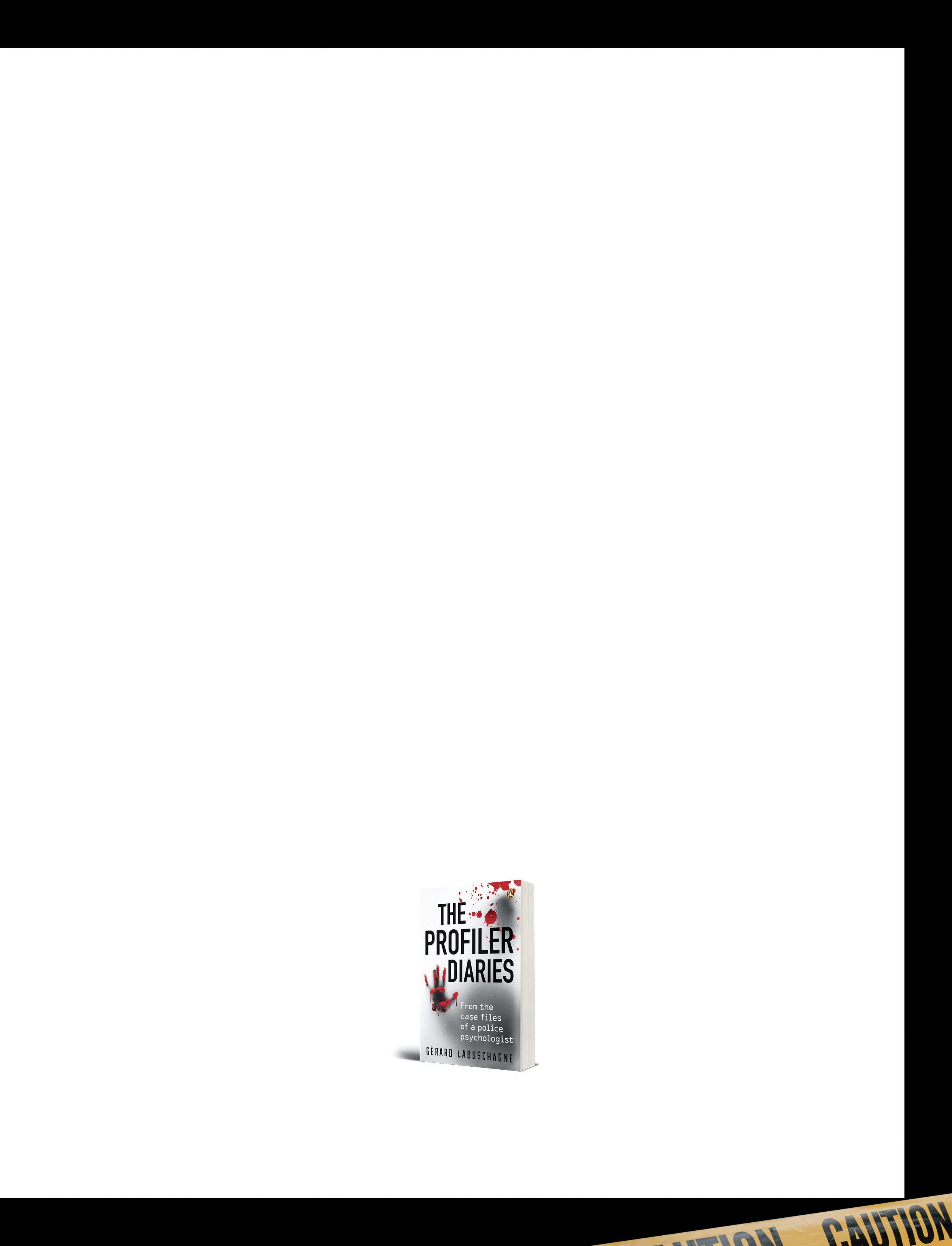
the scene, heard the deceased’s phone ringing in his pocket, and he took it out and answered it. He told Mabel that they were with Thembinkosi and would bring him to her. She quickly realised that she wasn’t being told the truth and began to cry. It is never a good sign if a member of the police answers a phone that you are calling.
At 22h15, Mabel again called Thembinkosi’s number, and another policeman answered. He told Mabel that Thembinkosi was ‘sleeping’, and that when he woke up, they would bring him to her. Mabel told the policeman that she knew he was lying to her, and she ended the call.
I mean, really, what a silly thing to tell her.
Mabel approached her employer, Cornelius Barnard, on whose property she lived, and told him that she thought Thembinkosi was dead. Barnard then drove her to the Montclair SAPS. On the way, however, they went past the crime scene and saw a body covered in a foil blanket. Mabel told Barnard that she suspected it was Thembinkosi lying there, but they continued on to the police station. There, some policemen informed her that the scene was at Kenyon Howden Road; in other words, the scene they had just driven past.
Barnard and Mabel then drove back to the scene. The mortuary van had arrived by then, and the foil blanket had been taken off the body. Mabel immediately recognised Thembinkosi’s clothes. I shudder to think how she must have felt, especially given the state of the crime scene. These are the types of things I allow myself to think of only years after leaving the police. At the time, you suppress any emotions. You don’t want to think about the emotional impact a crime has on others in order to protect yourself and to allow you to focus on the task at hand. That detachment allows you to stay sane and to continue to do your work; it also tends to involve the type of gallows humour that shocks outsiders.
The violent-crime report, which is supposed to be sent to the War Room at Durban Central within thirty minutes of the attendance of a scene, merely states the following under ‘Details of Crime’: ‘The deceased was attacked by unknown male with an axe on head, neck & hands’.”
Author Maggie Shipstead chats about the yearning for adventure and the daredevil female aviator protagonist in her new book, Great Circle.
“While I was writing Great Circle, my third novel, a friend asked me if I could describe what it was about in one word. I replied without hesitation: scale. It’s about the dimension of a life versus that of the planet, two things that, depending on how you look at them, can be understood as either tiny or vast.
Given more words, I would have said that Great Circle is about a pilot, a woman named Marian Graves, who disappears in Antarctica in 1950 while attempting to fly around the world north-south, and it’s about how her story intersects with that of a modern movie star playing her in a biopic. I would have tried to explain that the book is about Marian’s lost parents and her twin brother and her unusual upbringing in Montana and her love affairs and her driving impulse toward freedom, and I would have said it’s about aviation and Hollywood and war and telling stories and how disappearance and death are often the same but feel different to those left behind.
This novel is not autobiographical, but, inevitably, it is a reflection of my inner life: what I think about, what I care about, and how I understand and imagine my fellow humans.
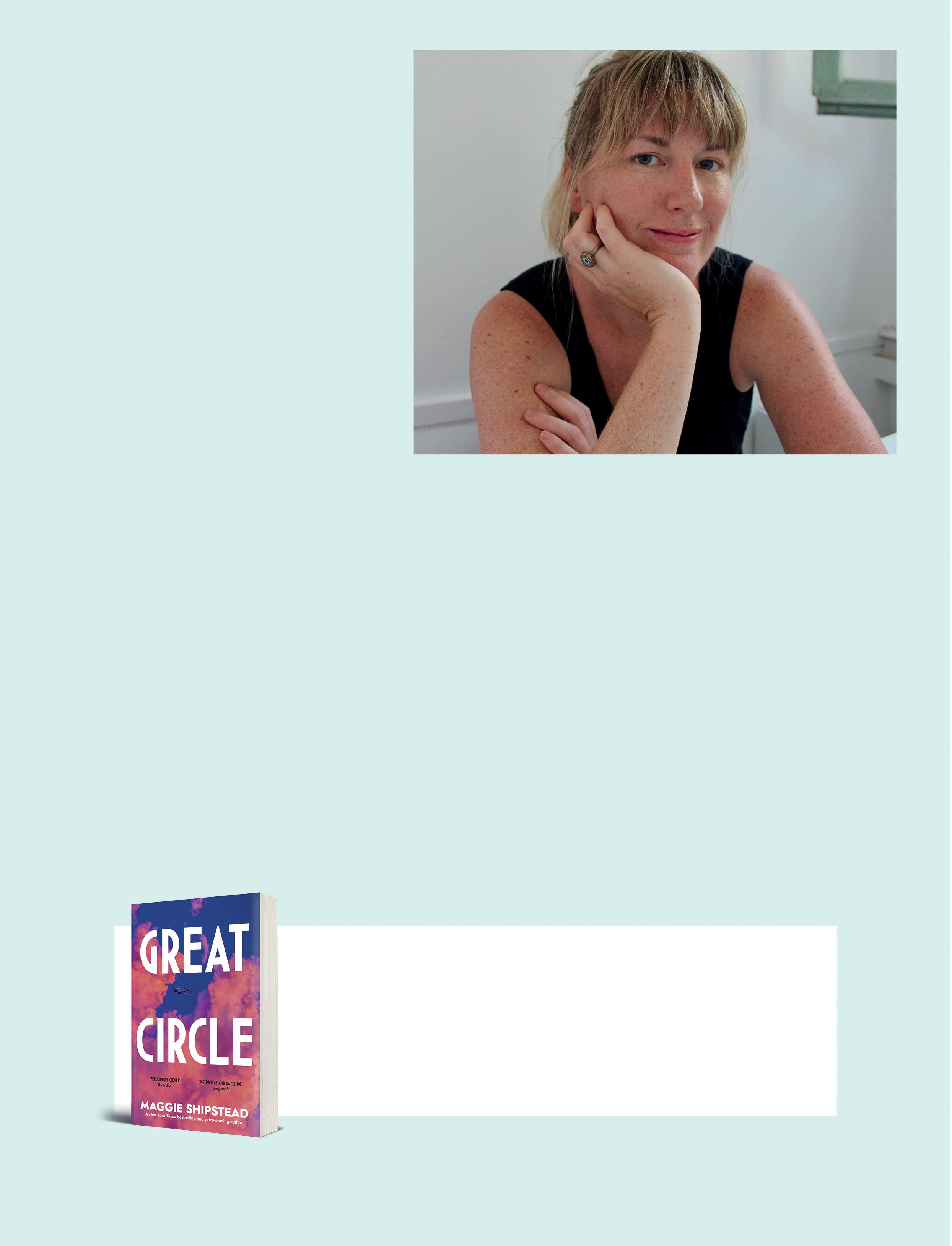
Great Circle is partly intended, too, as a love letter to our magnificent, fragile planet. In the years I was writing the book, I travelled widely, especially to the places I would eventually send Marian. I lived in Missoula, Montana for two months. I visited Antarctica and Alaska and the High Arctic and the South Pacific and elsewhere, though so many elsewhere remain. I am not a pilot, but I found opportunities to ride in gliders and vintage planes, to land on ice caps and tiny tropical islands. Marian’s yearning to see as much as she can of the world is something I share, as is the poignance of knowing it will never be enough.
If I were to pick a second word to explain what Great Circle is about, it would be freedom. Freedom is precious, and I believe we will all emerge from this time of quarantine identifying more strongly than ever with Marian’s urge to take flight, to go.”
The life of Marian Graves has always been marked by a lust for freedom and danger. In 1950, she embarks on the great circle flight, circumnavigating the globe. It is Marian’s life dream and her final journey, before she disappears without a trace. Half a century later, Hadley Baxter, a brilliant, troubled Hollywood starlet, is irresistibly drawn to play Marian Graves, a role that will lead her to probe the deepest mysteries of the vanished pilot’s life. An enthralling journey over oceans and continents and a drama of exhilarating power.
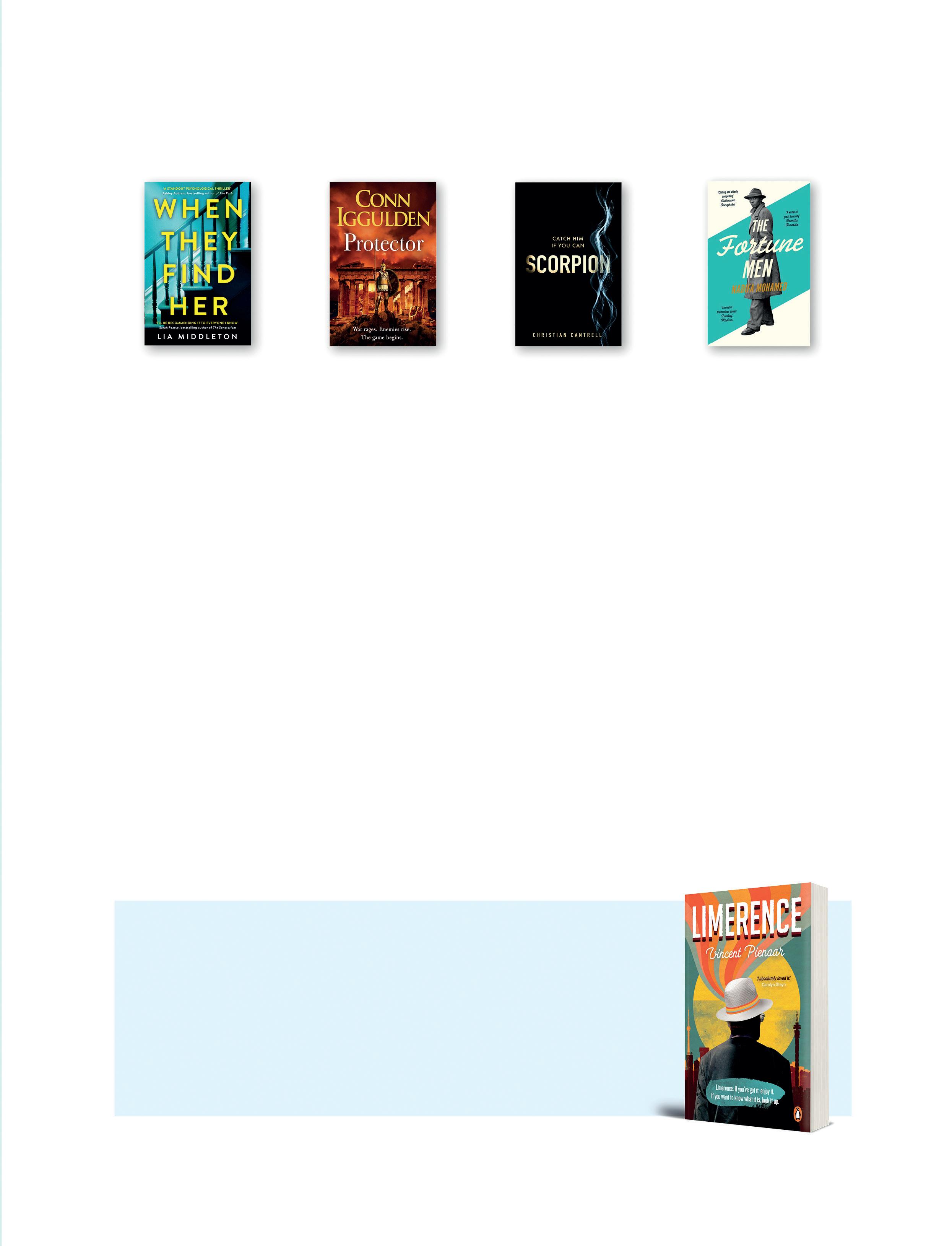
A year ago, Naomi made a dreadful mistake, and lost custody of her only child. Now, her daughter has come to stay, and Naomi knows it’s her one chance to rebuild her family. But the night ends in a terrible accident. And Naomi tells a lie she can never take back: she reports her daughter missing. Within hours, journalists crowd the driveway. Police search the nearby woods. Her ex-husband paces the hall. And Naomi can’t look away. Because the only thing worse than the lie she’s told is the truth: she has no memory of what really happened that night... A haunting and nerve-shredding debut.
Athenian 02: Protector by Conn Iggulden
In their home waters, Athenians will face a vast fleet. On sacred land, a Persian host waits for them to move. Outnumbered, outmatched, the Greeks must stand side by side to have any hope at all. For the Spartans, it is a chance to show who they truly are. For the Athenians, it is about surviving the storm. Once more, Themistocles must risk his honour and his life to protect the people he loves. Discover the rise and fall of the world’s greatest empire in the stunning second novel in the historical Athenian series.
Around the world, people have been murdered. The victims fit no profile, the circumstances vary wildly, but one thing links them all: in every case the victim is branded with a number. With police around the globe floundering, CIA Analyst Quinn Mitchell is called in to investigate. It’s not long before Quinn is on the killer’s tail. As she races against time to find out who the killer is, she is prepared to catch this assassin with limitless resources. What she isn’t prepared for is the person pulling the strings... a gripping cat-and-mouse thriller with an ending you won’t see coming.
The Fortune Men by Nadifa Mohamed Mahmood Mattan is a fixture in Cardiff's Tiger Bay, 1952, which bustles with Somali and West Indian sailors, Maltese businessmen and Jewish families. He is a father, chancer, petty criminal. He is a smooth-talker with rakish charm and an eye for a good game. He is many things, but he is not a murderer. A vividly atmospheric story of a Somali sailor who is seeking his fortune in Britain when he is accused of a crime he did not commit – the murder of a shopkeeper in Tiger Bay. Based on a true and astonishing case of wrongful conviction, the novel brings to life forgotten black British history.
Limerence by Vincent Pienaar
When Clarissa shook Scout from her life forty years ago, she hoped she would never ever see him again. But here he is, on her doorstep. He regrets that they parted on such bad terms. To make amends, he has named her his sole beneficiary in his last will and testament. Oh, and by the way, could she lend him four hundred thousand bucks? Months later Clarissa is summoned to a lawyer’s office. She assumes Scout has kicked the bucket and that there will be a reading of his will. But when she arrives, four other women tell her to join the queue. Warm-hearted and funny, this is a tale guaranteed to lift the spirits of even the sourest of exes.
DAY and the English block toilets were clearly not the best place to hide from the fiasco. I’d planned to lock myself in a cubicle with a library book and dodge the whole thing. But, as I pushed into the mint green arena, I found a cluster bomb of girls, fighting for mirror space and panicking about the state of their faces.
“Can I borrow your mascara? My eyelashes look like they’ve become freaking…vegan?”
“My hair! Why is it doing this to me?”
Entire contents of make-up bags were dumped into the sinks. The air stank of a pungent mixture of hairsprays. I bumped into Grace, who was leaning over the mirror with the best lighting.
“Sorry!”
I watched her weigh up whether I was worth disciplining before she half-smiled to accept the apology and returned to contouring her face. Though she raised her eyebrows at Laura on the neighbouring sink.
I was stuck. If I went to the loo now, they’d notice I’d stayed in there and no doubt spread a rumour I’d missed the photos due to chronic diarrhoea. My only option was to pretend I also needed to overhaul my appearance and wait until they’d finished. Getting to a mirror was tough, however. Grace, Amelia and Laura held three out of the four available – one each, of course. One mirror for the pretty one, one mirror for the scary one, and one for the sheep. All three of

them united in their commitment to unnecessary awfulness. The remaining mirror was being fought over by three others – not daring to complain. Chloe had a true talent for applying eyeliner under exceptional circumstances. She’d managed to load up her smoky eye perfectly despite access to only the mirror’s top corner. Her best friend, Hannah, squatted under her, piling concealer onto a chin spot. Both ignored me as I loitered. I had no lipstick to blot. No mascara to reapply. So I stood on my tippy-toes and punched my hair to try and give it volume.
Punch punch punch.
Why won’t they all hurry up?
I could only see a tiny fraction of myself in the mirror.
Punch punch punch.
Amelia pulled out a mini bottle of hairspray and fumigated her head. My eyes stung as the chemical mist drifted over and we all held back coughs. Amelia was the scary one. I glanced at my battered watch and took a step backwards, ready to inch my way into a cubicle, when the door slammed open with Mrs Collins on the threshold.
“Right, girls, come on. Preening over,” she barked in her thick Irish accent. “And do ANY of you remember the school rules about no make-up?”
Amelia continued to spray her hair. “But, miss, it’s the yearbook pictures.”
“Yes, and you were due in the hall five minutes ago.” She clapped her hands. Chloe jumped and ruined the corner of her eyeliner. “Out!” She started guiding
us out like a sheepdog.
“I need the loo,” I protested, as she tried to shepherd me with the rest of them.
“No, you don’t. Come on. Picture time.”
And with hair full of fruitless punches, I got frogmarched away.
IN THE HALL, everyone had broken the no-phones rule to use them as mirrors. The teachers were too slammed to stop us – pulling off the gigantic task of lining us up, firstly in alphabetical order for our individual shots, and then in height order for the year group photo. Photographers clicked away in two corners with their silvery umbrellas that somehow made us look slightly better, even with our acne and experimental haircuts. I shuffled to the back of the queue, jumper sleeves pulled over my hands, looking for Joe Vividichi and Lily Welsh. After five years of alphabetical lines, I knew to slot myself between them. In Year Seven, Joe and I once spoke about the annoyance of having a surname near the end of the alphabet because you always have to go last. Then he got attractive and popular and we’d never spoken since. Not that I’ve spoken to anyone much, especially since Ruby left.
We inched forward as pupils squatted on a stool and pulled their most attractive face. We all knew the significance of these photos. The yearbook headshot was the photo that comes to define you in history.
I didn’t want mine to be taken.
I really did not see any point. No one knew who I was, no one would remember me anyway. The most I’d be in our year group’s shared history was, “Oh yeah, that girl who never really spoke.”
But I was stuck in the line now and had no choice.
Soon enough, it was my turn to insert my forgettable face into nobody’s memory.
“Paige Vickers?” The photographer’s assistant looked up from her sheet and I stepped forward.
“Hello, Paige.” The photographer’s voice was way too boomy. He was all red and sweaty. “Come over here and sit on the stool for us, my love.”
I didn’t like that he’d called me “my love” but I sat down obligingly, wanting it over.
“Right, if you just swivel your knees round. No, not that way, the other way. That’s great, my darling. Okay, now twist your head towards me. No, too much.
To the right a bit. Brilliant.” He lurched up from behind his lens and mimed pulling each side of his mouth up. “Now big smile, missy. Come on, more. That’s better.” Snap snap snap. The umbrella flash created lightning throughout the hall. “Even bigger smile now, come on.”
Here was the problem. I did not know how to smile, especially for a photo. I’d had next to no practice.
“Huge grin. Come on! It’s your last year of school. You’ve got your whole future in front of you… Alright then. Never mind.”
Holly Bourne is a bestselling and critically acclaimed author. Inspired by her work with young people, and her own experiences of everyday sexism, Holly is a passionate mental health advocate and proud feminist. Holly lives in London, but dreams of the day she has a garden, dog, chickens, and a bee hive.

I got off the stool to make way for Lily and compliantly joined the height-order line. Mrs Collins was in her bossy element, herding us all into size-appropriate clumps. I accidentally caught Amelia’s eye and she gave me a dirty look for the crime. Despite being one of the most popular girls in school, Amelia knew who I was. My only minuscule claim to fame was that I was chief reporter for the school newspaper and nobody read it more intently than her group. Though I’d never been stupid enough to write anything other than wonderful stories about them. I stared at the dusty wooden floor and, ten minutes later, we were instructed to climb onto some dodgy metal scaffolding. The super-talls were led onto it first, boys joking about pushing each other off the back row, while teachers barked detention threats.
Mrs Collins pointed at my group. “Right, you lot next. Up you go. No funny business.”
I climbed the steps and siphoned myself into the second row, taking in the giant poster on the back wall reminding us to ask ourselves what Jesus would do. The scaffolding creaked and Sam Hutchins encouraged all the boys to jump. The shrieks thrummed in my ears as Mrs Collins issued him a detention.
“Stop it. All of you. You’re Year Eleven, for Christ’s sake. Bloody act like it,” she told us all.
Mr Photographer did not speak to us like we were Year Elevens.
“Right, boys and girls, I need you
to squeeze together for me. Squidge squidge squidge. Come on, don’t be shy. A bit more, a bit more…” We all gradually formed one big clump of navy blue jumpers, an impenetrable wad of literal uniformity. The teachers took their seats at the front, sandwiched by the shortest students. “Okay, everyone. I want to see huge smiles. On the count of three – one, two, three.” Umbrellas crackled around us, blinding us collectively. In an instant, we all became history, staring out into the future. We blinked from the flash, and when we opened our eyes, we’d already aged past the moment of capture.
The photographer grimaced at his camera screen. “Come on, let’s not be silly now.”
“What’s happened?” Mrs Collins barked.
“It appears some of your students thought it funny to give someone ‘bunny ears’.”
We looked around to discover the epicentre of the drama. Laughter rippled out from the front, near Joe Vividichi and Ethan Chambers. It appeared we had our suspects. And, judging by the red face of Charlie Shaw in front of them, it appeared we also had our victim. Charlie had muddled through school okay until he got drunk at the Year Nine disco and passed out in the boys’ toilets, soaked in his own urine. He’d since had a big bullseye on his back.
Mrs Collins twisted around in her chair. “Grow up. Honestly, what are you lot like?”
The international bestselling author of Diary of a Wimpy Kid fills us in on his biggest fear, writing in the cemetery and chickens hiding under mattresses.
Q. Where did the inspiration for Awesome Friendly Spooky Stories come from?
A. I wanted to do something really different, challenge myself. I also wanted to try writing short stories. I enjoyed doing both things immensely.
Q. What’s the scariest book you’ve picked up?
A. Probably The Shining by Stephen King.
Q. Have you ever seen a ghost?
A. No, but I had a ghostly encounter. It involved coins being strewn down the hallway in two separate locations, simultaneously.
Q. Would you rather be a zombie, vampire or werewolf?
A. I think a werewolf, because it’s the only one that doesn’t live forever.
Q. Are you afraid of the dark?
A. Sometimes! When I let my imagination go!
Q. What scared you when you were younger/a child?
A. Just about everything. I was especially scared someone was hiding behind my shower curtain.
Q. What do you think would give Rowley the spooks?
A. I think his greatest fear is that there’s a chicken hiding under his mattress.
Q. What’s the best piece of writing advice you’ve ever been given?
A. You can’t be a good writer without being a good reader first.
Q. Tell us about a book you’ve reread many times (and why)
A. Schulz and Peanuts by David Michaelis. It serves as a roadmap for my career, and helps me understand the possibilities.
Q. What is your ideal writing scenario?
A. Writing in my car, at the cemetery. It’s the only place I can really get any work done!

Q. If I didn’t become an author, I would be…
A. An online game developer. Which I also was, once upon a time!
Q. What’s the one popular children’s book you’ve never got round to reading?
A. The Phantom Tollbooth by Norman Juster.
Q. What’s your biggest fear?
A. Leaving my kids in debt.
Q. What inspired you to write Rowley Jefferson’s Awesome Friendly Spooky Stories?
A. We ’re living in scary times!
The awesome friendly Rowley Jefferson made his big debut in April 2019. Diary of an Awesome Friendly Kid: Rowley Jefferson's Journal was an immediate hit, along with the follow-up book, Rowley Jefferson's Awesome Friendly Adventure. Now, scare yourself silly with Rowley Jefferson’s Awesome Friendly Spooky Stories.
Grab a torch, crawl under the covers, and dive into the twisted, unexpectedly hilarious world of Rowley Jefferson’s imagination. You’ll meet zombies, vampires, ghosts, and much more in these comically terrifying tales. Rowley’s spooky stories might leave you laughing, but beware – you could end up sleeping with the lights on!
Ook beskikbaar as Rowley Jefferson se Vreeslike Vriendelike Spookstories
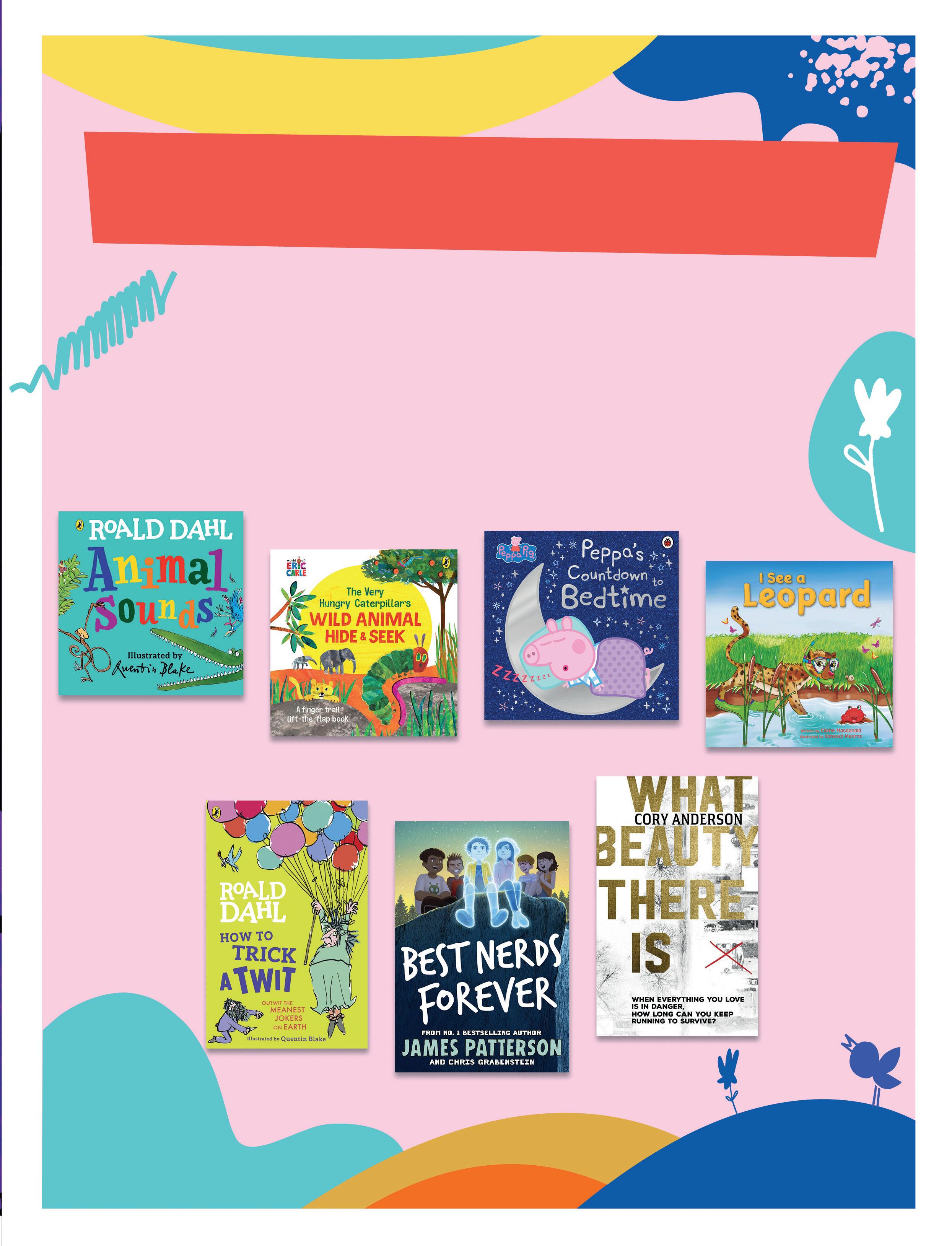

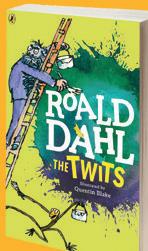


Bringing one of Ottolenghi’s recipes to life in your own kitchen has got to be the greatest culinary joy. But don’t take our word for it, try it out yourself!
“This is a wonderful meal on an autumn day, served with a crisp green salad. The slow-cooked chicken is packed full of flavour and the crust – gluten-free, rich and corny – makes for a welcome (and lighter) change to a heavier mash.”
3 tbsp olive oil
3 red onions, thinly sliced (500g)
2 garlic cloves, crushed
3 tbsp rose harissa (or 50% more or less, depending on variety) (60g)
2 tsp sweet smoked paprika
850g chicken thighs, skinless and boneless (about 9–10 thighs)
200ml passata
5 large tomatoes, quartered (400g)
200g jarred roasted red peppers, drained and cut into 2cm thick rounds
15g dark chocolate (70% cocoa solids)
20g coriander, roughly chopped salt and black pepper
70g unsalted butter, melted 500g corn kernels, fresh or frozen and defrosted (shaved corn kernels from 4 large corn cobs, if starting from fresh)
3 tbsp whole milk
3 eggs, yolks and whites separated
Heat the oil in a large sauté pan, for which you have a lid, on a medium high heat. Add the onions and fry for 8–9 minutes, stirring a few times, until caramelised and soft. Reduce the heat to medium and add the garlic, harissa, paprika, chicken, 1 teaspoon of salt and a good grind of black pepper. Cook for 5 minutes, stirring frequently, then add the passata and tomatoes. Pour over 350ml of water, bring to the boil, then simmer on a medium heat, covered, for 30 minutes, stirring every once in a while.
Add the peppers and chocolate and continue to simmer for another 35–40 minutes, with the pan now uncovered, stirring frequently, until the sauce is getting thick and the chicken is falling apart. Remove from the heat and stir in the coriander. If you are serving the chicken as it is (as a stew without the batter), it’s ready to serve (or freeze, once it’s come to room temperature) at this stage. If you are making the corn topping, spoon the chicken into a ceramic baking dish – one with high sides that measures about 20 x 30cm – and set aside.
Preheat the oven to 180°C fan.
Pour the butter into a blender with the corn, milk, egg yolks and ¾ teaspoon salt. Blitz for a few seconds,
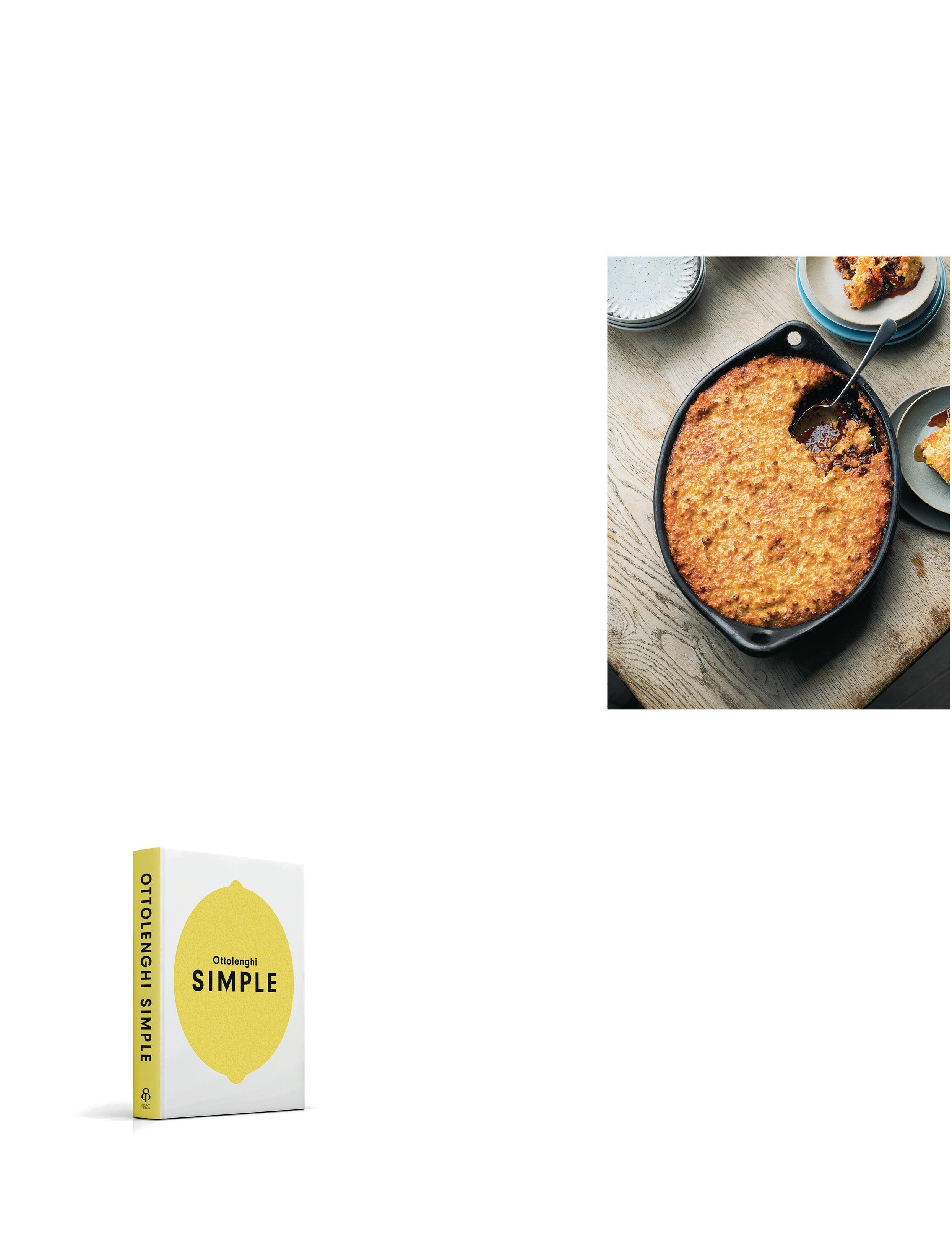
to form a rough paste, then spoon into a large bowl. Place the egg whites in a separate clean bowl and whisk to form firm peaks. Fold these gently into the runny corn mixture until just combined, then pour the mix evenly over the chicken.
Bake for 35 minutes, until the top is golden-brown: keep an eye on it after 25 minutes to make sure the top is not taking on too much colour: you might need to cover it with tin foil for the final 10 minutes. Remove from the oven and set aside for 10 minutes before serving.
Extracted from Ottolenghi Simple by Yotam Ottolenghi (Ebury Press).
Photographyby
Jonathan Lovekin“The ragù contained in this lasagne pays homage to penne all’Aconese, the first dish that Ixta fell madly in love with. The recipe is a closely guarded secret, but the complex, earthy and deeply umami flavour of dried porcini mushrooms is impossible to miss. This is our meatless take on that mythical sauce.”
750g chestnut mushrooms, halved
500g oyster mushrooms
135ml olive oil, plus extra for greasing
60g dried porcini mushrooms
30g dried wild mushrooms
2 dried red chillies, roughly chopped (deseeded for less heat)
500ml hot vegetable stock
1 onion, peeled and quartered
5 garlic cloves, roughly chopped
1 carrot, peeled and quartered (90g)
2–3 plum tomatoes, quartered (200g)
75g tomato paste
130ml double cream
60g Pecorino Romano, finely grated
60g Parmesan, finely grated
5g basil leaves, finely chopped
10g parsley leaves, finely chopped, plus an extra tsp to serve
250g dried lasagne sheets (that’s about 14 sheets) salt and black pepper
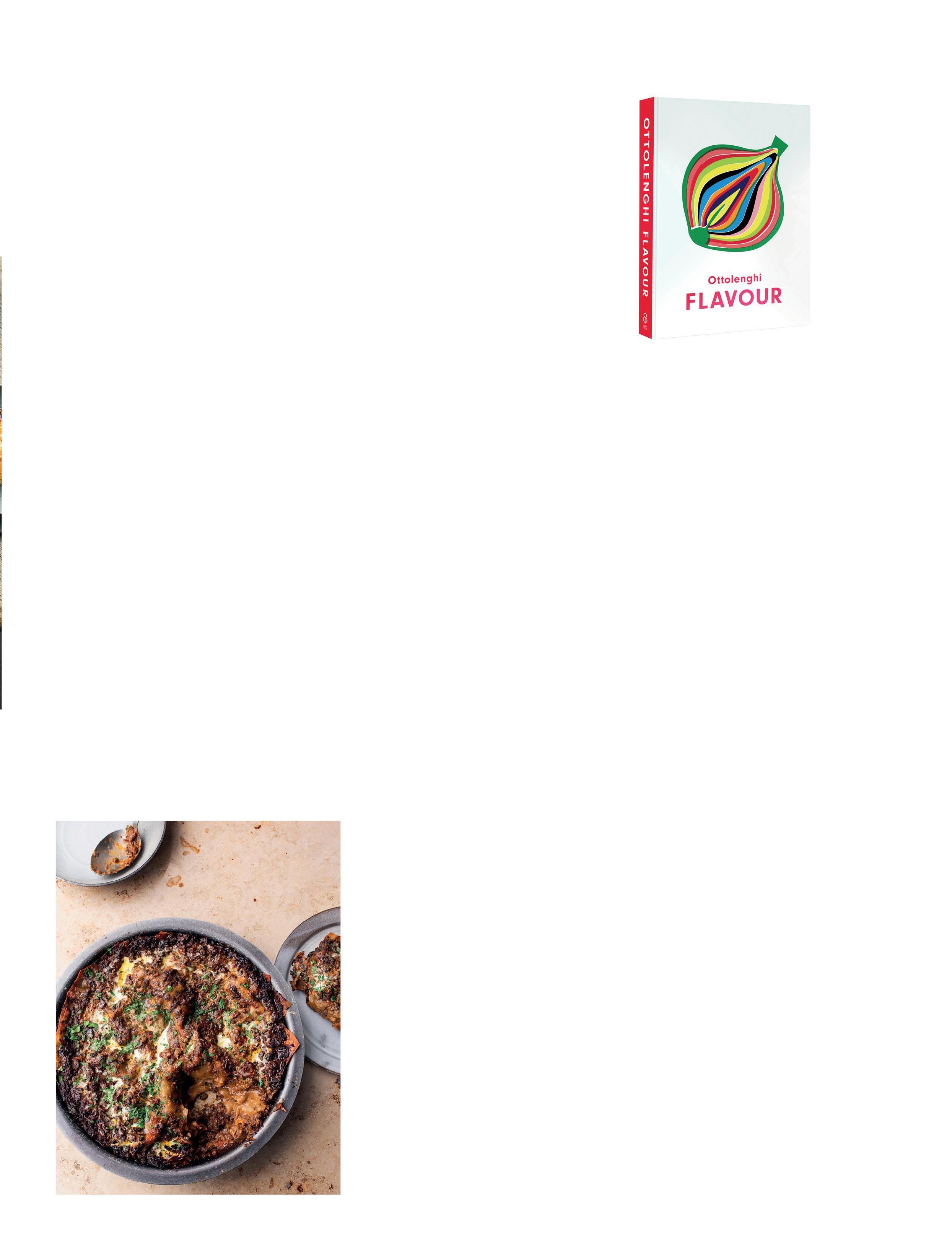
Preheat the oven to 230°C fan.
Put the chestnut and oyster mushrooms into the large bowl of a food processor in three or four batches and pulse each batch until finely chopped (or finely chop everything by hand). Toss the chopped mushrooms in a large bowl with 3 tablespoons of oil and 1 teaspoon of salt and spread out on a large, 40cm x 35cm parchmentlined, rimmed baking tray. Bake for 30 minutes near the top of the oven, stirring three times throughout, until the mushrooms are golden-brown; they will have reduced in volume significantly. Set aside. Reduce the oven temperature to 200°C fan.
Meanwhile, combine the dried mushrooms, chillies and hot stock in a large bowl and set aside to soak for half an hour. Strain the liquid into another bowl, squeezing as much liquid from the mushrooms as possible to get about 340ml: if you have any less, top up with water. Very roughly chop the rehydrated mushrooms (you want some chunks) and finely chop the chillies. Set the stock and mushrooms aside separately.
Put the onion, garlic and carrot into the food processor and pulse until finely chopped (or finely chop everything by hand). Heat 60ml of oil in a large sauté pan or pot on a medium-high heat. Once hot, add the onion mixture and fry for 8 minutes, stirring occasionally, until soft and golden. Pulse the tomatoes in the food processor until finely chopped (or finely chop by hand), then add to the pan along with the tomato paste, 1½ teaspoons of salt and 1¾ teaspoons of freshly cracked black pepper. Cook for 7 minutes, stirring occasionally. Add the rehydrated mushrooms and chillies and the roasted mushrooms and cook for 9 minutes, resisting the urge to stir: you want the mushrooms
to be slightly crisp and browned on the bottom. Stir in the reserved stock and 800ml of water and, once simmering, reduce the heat to medium and cook for about 25 minutes, stirring occasionally, until you get the consistency of a ragù. Stir in 100ml of the cream and simmer for another 2 minutes, then remove from the heat.
Combine both cheeses and both herbs in a small bowl. To assemble the lasagne, spread one-fifth of the sauce in the bottom of a round 28cm baking dish (or a 30cm x 20cm rectangular dish), then top with a fifth of the cheese mixture, followed by a layer of lasagne sheets, broken to fit where necessary. Repeat these layers three more times in that order, and finish with a final layer of sauce and cheese: that’s five layers of sauce and cheese and four layers of pasta.
Drizzle over 1 tablespoon of cream and 1 tablespoon of oil, then cover with foil and bake for 15 minutes. Remove the foil, increase the temperature to 220°C fan and bake for another 12 minutes, turning the dish round halfway. Turn the oven to the grill setting and grill for a final 2 minutes, until the edges are brown and crisp. Set aside to cool for 5 or so minutes, then drizzle over the remaining tablespoon of cream and oil. Sprinkle over the remaining parsley, finish with a good grind of pepper and serve.
Extracted from Ottolenghi FLAVOUR by Yotam Ottolenghi and Ixta Belfrage (Ebury Press)
There is a much deeper context that begs unearthing if we’re to fully understand the impact of music, writes Blues for the White Man author, Fred de Vries
“It’s like therapy, having music discussions with old friends. It’s a comfort zone, a safe space, centring around the same basic questions. Who was the best Beatle, Paul or John? Inevitably someone drags in George. Which was a most punk city, New York or London? Manchester, a clever contrarian suggests. Was Prince a genius? Einstein was a genius, not some pop musician, my partner sneers. It’s mainly boys stuff, and the debates get more intense as the booze flows freely. Then someone (usually me) shouts, ‘The Wall was Pink Floyd’s worst album. Highly overrated!’ And off we go again.
Occasionally you do get a surprise. Take my friend M., who is twenty years younger than I am and female. We sometimes send each other Spotify links, me as the older connoisseur, she as the younger upstart.
‘I don’t like Spoon at all,’ she WhatsApps me, after I called it “sexy music”.
‘Really??’ I reply, looking for the emoji for astonishment and disbelief.
It turns out that we listen very differently. She sits back and lets the sounds, the melodies, the words engulf her. She immerses herself in the instrumentation, the various layers and nuances. It’s all she needs. She’s what you call a “listener”.
I, on the other hand, am a sucker for extra-musical stuff. Things I need to know include year of release, producer, composer(s), influences, hairstyles, origins. If it’s London or New York, I want to find out which part of
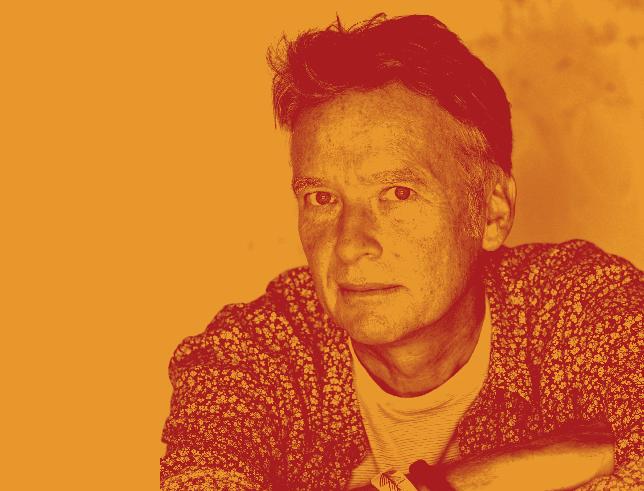
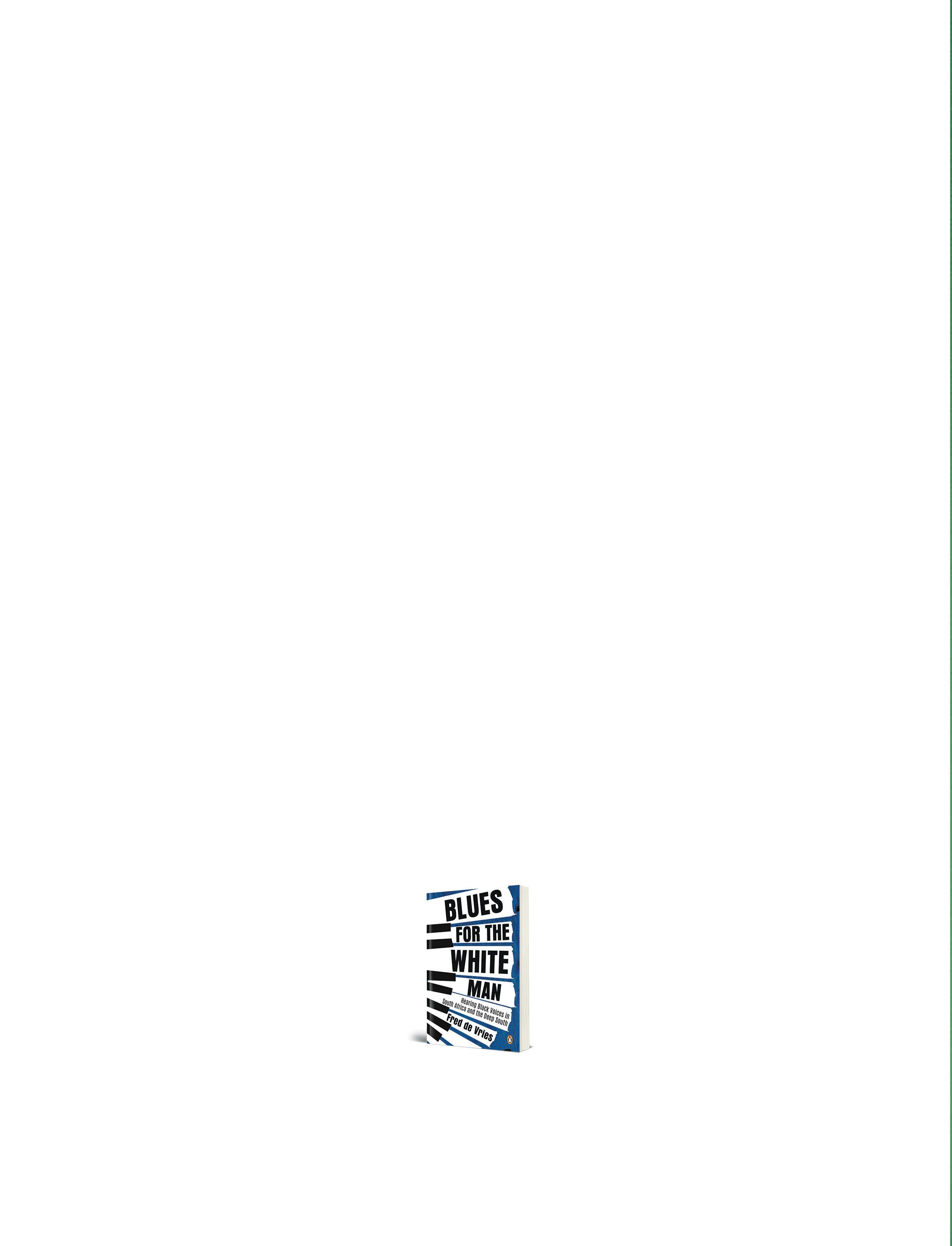
Born in the late fifties, I grew up listening to Cream, Led Zeppelin, The Rolling Stones; essentially white guys playing black music. I needed context.
the city they are from. Brixton? Queens? All essential to understand a song or an album. In other words, I need contextualisation. I can’t stand it if people think that Led Zeppelin and Nirvana happened around the same time. Or if they don’t know that John Coltrane’s Impressions from 1963 influenced The Byrds’ hit single ‘Eight Miles High’ from 1966, which heralded the advent of the psychedelic era. That kind of thing.
Context was what I was looking for when I visited America’s Deep South a few years ago, to do research for my book Blues for the White Man. Born in the late fifties, I grew up listening to Cream, Led Zeppelin, The Rolling Stones; essentially white guys playing black music. I knew a bit. But that wasn’t enough. There was no texture, no smell, only worn-out record sleeves with snippets of information. I had to visit the juke joints of Mississippi, stand at the grave of Sonny Boy Williamson, sniff the water of the Mississippi River. I had to see Memphis, home of Sun Studio and Stax Records, the city where Elvis Presley overdosed on pills and junk food, where Jeff Buckley drowned and Martin Luther King was assassinated. Nashville, New Orleans, Mississippi Delta...
So I flew to Atlanta, hired a car and immersed myself in the culture, from slavery to Robert Johnson to Black Lives Matter. The power of the blues, wrote Jamey Hatley in the Oxford American is ‘about making a connection to people through heartache and pain.’ Damn right. Because there’s more. So much more…”
